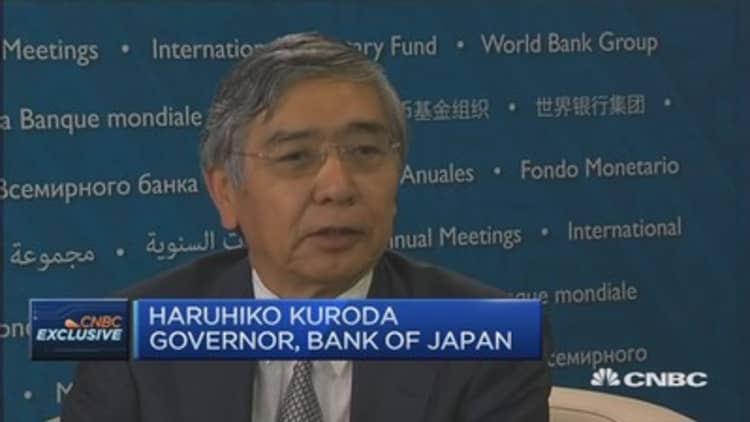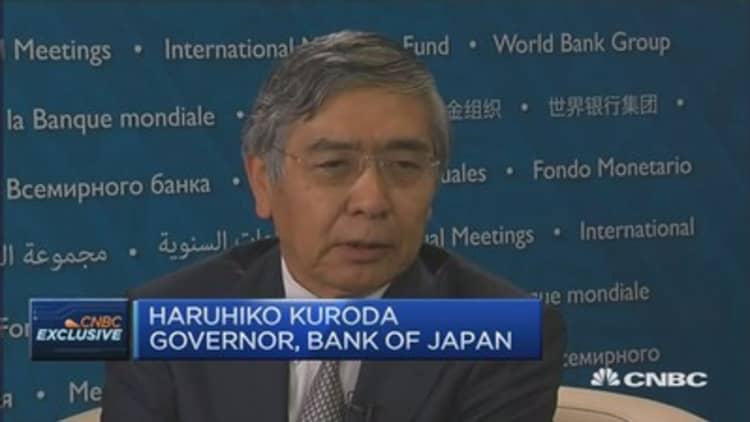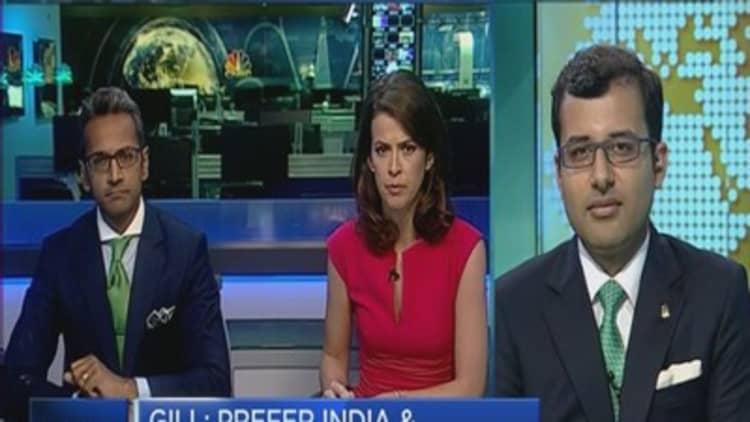


Bank of Japan (BoJ) Governor Haruhiko Kuroda has poured cold water on mounting expectations for a fresh round of quantitative easing (QE) in October .
In an interview on the sidelines of an International Monetary Fund meeting (IMF) in Peru, Kuroda told CNBC that Japan's inflation rate was in line with the central bank's expectations.
"If necessary, we can further ease our monetary policy but at this moment the inflation dynamics is as we anticipated. So, at this stage we just continue QE, but if necessary we can adjust."
Widely seen as Japan's key indicator for monetary policy, core consumer prices (also known as headline prices) contracted 0.1 percent in August after July's flat reading, underscoring the impact of falling energy prices and fueling calls for stimulus to accelerate inflation to the BoJ's 2 percent target by 2016.
August's report marked the first annual decline since the central bank began its 'kitchen sink' stimulus package in April 2013.
The BoJ left policy unchanged at its monthly review last week in a widely anticipated move, but several economists, including those at the IMF, believe additional easing is necessary to counterbalance weak industrial production and exports and disappointing wage growth that are heightening risks for Japan to enter a technical recession in the third quarter. The economy also faces risks from external factors, including weakness in emerging markets and higher U.S. interest rates.
Read MoreTarnished Abenomics gets fresh ammunition from TPP
As of late, calls have loudened for the bank to take action as early as October .
"The slowing economy could trigger a technical recession in Japan, which would intensify deflationary pressure. To counterbalance these negative developments, the BoJ is expected to provide additional monetary stimulus measures at the October 30th meeting, when it will release its new economic outlook," Natixis said in a report last week.
Societe Generale echoed those concerns in a recent note, saying it expected the bank to increase its monetary base to 85 trillion yen at the October 30th meeting, with the increase mainly allocated to risk assets, including ETFs.
"Given that the government is likely to declare a successful exit from deflation by the time the upper house election is held next summer, the next QE measure will probably be the last one in the current monetary cycle," SocGen added.
Kuroda, however, continued to be a cheerleader despite rising evidence of a weaker economy, insisting that current policy was paving the way for strengthening underlying inflation.
"If you look at it [headline inflation] carefully, energy items may be declining by about 1 percent or reducing the CPI rate by 1 percent, but non-energy items are raising CPI by about 1 percent, so they are cancelling out," he told CNBC .
"Unless oil prices decline further, the negative impact from oil will eventually dissipate, fade out, disappear and then 1 percent inflation is quite likely to come and because of the reduced output gap, and tight labor market conditions, I think we can approach 2 percent inflation sometime next year."
Read MoreJapan bought a whole lotta Indonesian bonds in August
Commodity prices are a double-edged sword for Japan. The nation is one of the world's biggest oil importers so it benefits from cheaper prices but at the same time, its exports suffer because lower oil prices hurt emerging Asian nations dependent on commodity exports. Those emerging markets buy more than 50 percent of Japan's exports.
On oil, Kuroda refuted speculation that a price recovery would hurt Japan, saying it would instead reflect a stronger global economy.
He also ruled out taking a page from the European Central Bank's book, saying he wasn't considering using negative interest rates on bank deposits as a way of stimulating the economy.
"We don't think it's necessary. The ECB certainly introduced negative interest rates but after that, they embarked on QE and we have been implementing a large-scale asset purchase program for more than two years, so I don't think it's necessary to make interest rates negative."


